Posted on October 16th, 2011 by ASEE
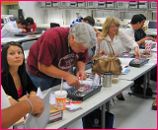 Despite the anxiety triggered by last spring’s nuclear disaster in Japan, nuclear power is still a key part of this country’s energy mix. Industry and universities are enlisting help from teachers in preparing the next generation of nuclear engineers and technicians.
Despite the anxiety triggered by last spring’s nuclear disaster in Japan, nuclear power is still a key part of this country’s energy mix. Industry and universities are enlisting help from teachers in preparing the next generation of nuclear engineers and technicians.
Read More
Filed under: Special Features | Comments Off on Feature: Nuclear Energizes Teachers
Tags: Electrical, Electrical Engineering, Energy, Nuclear Engineering, Nuclear Science, Programs for Teachers, Teacher Training, Teacher Workshops, Teachers, Workshops
Posted on October 13th, 2011 by Jaimie Schock
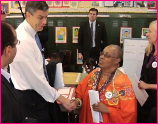 The NASA Endeavor Science Teaching Certificate Project awards one-year fellowships each year to over 40 current and prospective teachers. Endeavor Fellows receive award-winning STEM Professional Development, taking graduate courses in an innovative, LIVE (online) format from the comfort of their home or school.
The NASA Endeavor Science Teaching Certificate Project awards one-year fellowships each year to over 40 current and prospective teachers. Endeavor Fellows receive award-winning STEM Professional Development, taking graduate courses in an innovative, LIVE (online) format from the comfort of their home or school.
Read More
Filed under: For Teachers, K-12 Outreach Programs | Comments Off on Fellowship: NASA Endeavor Project
Tags: NASA, Programs for Teachers, Scholarships and Fellowships, Teacher Training
Posted on October 4th, 2011 by Jaimie Schock
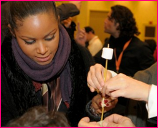 The American Society for Engineering Education (ASEE) has put together a public/private partnership to develop ways of engaging elementary, middle, and high school students in engineering. Participants will learn about innovative, hands-on, project-based engineering at three events during National Science Teachers Association regional conferences.
The American Society for Engineering Education (ASEE) has put together a public/private partnership to develop ways of engaging elementary, middle, and high school students in engineering. Participants will learn about innovative, hands-on, project-based engineering at three events during National Science Teachers Association regional conferences.
Read More
Filed under: For Teachers, K-12 Outreach Programs | 1 Comment »
Tags: American Society for Engineering Education, Conference, Conferences and Meetings, Department of Defense, NASA, National Science Teachers Association, Professional Development, Teacher Training
Posted on August 28th, 2011 by ASEE
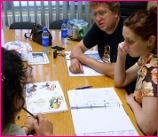 Education reformers oversell the importance of highly skilled teachers and undervalue the benefits that come from teacher collaborations, according to a University of Pittsburgh specialist in organizations. An article in the Stanford Social Innovation Review says students “showed higher gains in math achievement when their teachers reported frequent conversations with their peers that centered on math, and when there was a feeling of trust or closeness among teachers.”
Education reformers oversell the importance of highly skilled teachers and undervalue the benefits that come from teacher collaborations, according to a University of Pittsburgh specialist in organizations. An article in the Stanford Social Innovation Review says students “showed higher gains in math achievement when their teachers reported frequent conversations with their peers that centered on math, and when there was a feeling of trust or closeness among teachers.”
Read More
Filed under: K-12 Education News | Comments Off on Study: Good Teaching is Not a One-Person Show
Tags: Education Policy, Research on Learning, Teacher Training, Teachers
Posted on August 28th, 2011 by Mary Lord
 Attention, STEM majors. The nation needs more middle and high school science teachers — and there are several new initiatives to encourage you to sign up for training. Indiana’s Valparaiso University, for instance, just received a $500,000 federal grant to train science undergraduates as educators. The program will include paid summer internships and student-teaching stints.
Attention, STEM majors. The nation needs more middle and high school science teachers — and there are several new initiatives to encourage you to sign up for training. Indiana’s Valparaiso University, for instance, just received a $500,000 federal grant to train science undergraduates as educators. The program will include paid summer internships and student-teaching stints.
Read More
Filed under: K-12 Education News | Comments Off on New Push for Science Teachers
Tags: education programs, National Science Foundation, Public Policy, STEM majors, STEM teacher training, Teacher Training, undergraduate
Posted on July 17th, 2011 by Mary Lord
 Join PBS’s Design Squad Nation and ASEE’s Engineering Go For It for a free webinar entitled “Inspiring the Next Generation of Engineers,” on August 25 from 12 PM to 1 PM EDT. Learn about free hands-on activities, videos, and other online resources that will help enliven your classes and spark a love of engineering in kids ages 9 and up.
Join PBS’s Design Squad Nation and ASEE’s Engineering Go For It for a free webinar entitled “Inspiring the Next Generation of Engineers,” on August 25 from 12 PM to 1 PM EDT. Learn about free hands-on activities, videos, and other online resources that will help enliven your classes and spark a love of engineering in kids ages 9 and up.
Watch a replay of the webinar here:
http://wgbh1.adobeconnect.com/p47qx88dmmb/
Read More
Filed under: For Teachers, Grades 6-8, Grades 9-12, Grades K-5, K-12 Outreach Programs, Web Resources | Comments Off on Inspire the Next Generation of Engineers
Tags: Design Squad, Engineering, Events, Resources for Teachers, Teacher Training, Web Resources, Webinar
Posted on June 19th, 2011 by Mary Lord
 Teacher layoffs nationwide threaten to make a bad STEM education situation worse, as more educators must cover subjects they are not certified to teach. A new survey by the National Center for Education Statistics (NCES) found that fewer than half the chemistry and physical science teachers in public high schools had degrees in those fields, with about 30 percent lacking certification in those subjects.
Teacher layoffs nationwide threaten to make a bad STEM education situation worse, as more educators must cover subjects they are not certified to teach. A new survey by the National Center for Education Statistics (NCES) found that fewer than half the chemistry and physical science teachers in public high schools had degrees in those fields, with about 30 percent lacking certification in those subjects.
Read More
Filed under: K-12 Education News | Comments Off on Many STEM Teachers Lack Majors
Tags: Higher Education, Public Policy, Research on Learning, Science, Teacher Training, Teachers
Posted on May 27th, 2011 by Jaimie Schock
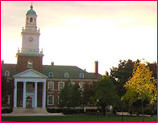 Johns Hopkins University’s Engineering for Professionals (EP) program, part of the Whiting School of Engineering, will provide free tuition beginning with the summer term to Maryland public and private high school teachers who want to further their professional development in STEM disciplines.
Johns Hopkins University’s Engineering for Professionals (EP) program, part of the Whiting School of Engineering, will provide free tuition beginning with the summer term to Maryland public and private high school teachers who want to further their professional development in STEM disciplines.
Read More
Filed under: For Teachers, K-12 Outreach Programs | Comments Off on Free Courses for STEM Teachers
Tags: Courses, Higher Education, Professional Development, Programs for Teachers, STEM education, Teacher Resources, Teacher Training
Posted on May 15th, 2011 by Jaimie Schock
 Finland enjoys a surprising claim to fame: world-class K-12 education. Only a handful of nations come close to matching Finland in math, science, and literacy, and none boasts such uniformly high achievement rates across regions and income levels. How could the country produce 15-year-olds on par with Asia’s whiz kids? The answer may reside in teacher training and approach.
Finland enjoys a surprising claim to fame: world-class K-12 education. Only a handful of nations come close to matching Finland in math, science, and literacy, and none boasts such uniformly high achievement rates across regions and income levels. How could the country produce 15-year-olds on par with Asia’s whiz kids? The answer may reside in teacher training and approach.
Read More
Filed under: Special Features | 1 Comment »
Tags: International K-12 Education, Teacher Training, Teachers, Testing
 Despite the anxiety triggered by last spring’s nuclear disaster in Japan, nuclear power is still a key part of this country’s energy mix. Industry and universities are enlisting help from teachers in preparing the next generation of nuclear engineers and technicians.
Despite the anxiety triggered by last spring’s nuclear disaster in Japan, nuclear power is still a key part of this country’s energy mix. Industry and universities are enlisting help from teachers in preparing the next generation of nuclear engineers and technicians. 








 The NASA Endeavor Science Teaching Certificate Project awards one-year fellowships each year to over 40 current and prospective teachers. Endeavor Fellows receive award-winning STEM Professional Development, taking graduate courses in an innovative, LIVE (online) format from the comfort of their home or school.
The NASA Endeavor Science Teaching Certificate Project awards one-year fellowships each year to over 40 current and prospective teachers. Endeavor Fellows receive award-winning STEM Professional Development, taking graduate courses in an innovative, LIVE (online) format from the comfort of their home or school.  The American Society for Engineering Education (ASEE) has put together a public/private partnership to develop ways of engaging elementary, middle, and high school students in engineering. Participants will learn about innovative, hands-on, project-based engineering at three events during National Science Teachers Association regional conferences.
The American Society for Engineering Education (ASEE) has put together a public/private partnership to develop ways of engaging elementary, middle, and high school students in engineering. Participants will learn about innovative, hands-on, project-based engineering at three events during National Science Teachers Association regional conferences. Education reformers oversell the importance of highly skilled teachers and undervalue the benefits that come from teacher collaborations, according to a University of Pittsburgh specialist in organizations. An article in the Stanford Social Innovation Review says students “showed higher gains in math achievement when their teachers reported frequent conversations with their peers that centered on math, and when there was a feeling of trust or closeness among teachers.”
Education reformers oversell the importance of highly skilled teachers and undervalue the benefits that come from teacher collaborations, according to a University of Pittsburgh specialist in organizations. An article in the Stanford Social Innovation Review says students “showed higher gains in math achievement when their teachers reported frequent conversations with their peers that centered on math, and when there was a feeling of trust or closeness among teachers.” Attention, STEM majors. The nation needs more middle and high school science teachers — and there are several new initiatives to encourage you to sign up for training. Indiana’s Valparaiso University, for instance, just received a $500,000 federal grant to train science undergraduates as educators. The program will include paid summer internships and student-teaching stints.
Attention, STEM majors. The nation needs more middle and high school science teachers — and there are several new initiatives to encourage you to sign up for training. Indiana’s Valparaiso University, for instance, just received a $500,000 federal grant to train science undergraduates as educators. The program will include paid summer internships and student-teaching stints.  Join PBS’s Design Squad Nation and ASEE’s Engineering Go For It for a free webinar entitled “Inspiring the Next Generation of Engineers,” on August 25 from 12 PM to 1 PM EDT. Learn about free hands-on activities, videos, and other online resources that will help enliven your classes and spark a love of engineering in kids ages 9 and up.
Join PBS’s Design Squad Nation and ASEE’s Engineering Go For It for a free webinar entitled “Inspiring the Next Generation of Engineers,” on August 25 from 12 PM to 1 PM EDT. Learn about free hands-on activities, videos, and other online resources that will help enliven your classes and spark a love of engineering in kids ages 9 and up. Teacher layoffs nationwide threaten to make a bad STEM education situation worse, as more educators must cover subjects they are not certified to teach. A new survey by the National Center for Education Statistics (NCES) found that fewer than half the chemistry and physical science teachers in public high schools had degrees in those fields, with about 30 percent lacking certification in those subjects.
Teacher layoffs nationwide threaten to make a bad STEM education situation worse, as more educators must cover subjects they are not certified to teach. A new survey by the National Center for Education Statistics (NCES) found that fewer than half the chemistry and physical science teachers in public high schools had degrees in those fields, with about 30 percent lacking certification in those subjects.  Johns Hopkins University’s Engineering for Professionals (EP) program, part of the Whiting School of Engineering, will provide free tuition beginning with the summer term to Maryland public and private high school teachers who want to further their professional development in STEM disciplines.
Johns Hopkins University’s Engineering for Professionals (EP) program, part of the Whiting School of Engineering, will provide free tuition beginning with the summer term to Maryland public and private high school teachers who want to further their professional development in STEM disciplines. Finland enjoys a surprising claim to fame: world-class K-12 education. Only a handful of nations come close to matching Finland in math, science, and literacy, and none boasts such uniformly high achievement rates across regions and income levels. How could the country produce 15-year-olds on par with Asia’s whiz kids? The answer may reside in teacher training and approach.
Finland enjoys a surprising claim to fame: world-class K-12 education. Only a handful of nations come close to matching Finland in math, science, and literacy, and none boasts such uniformly high achievement rates across regions and income levels. How could the country produce 15-year-olds on par with Asia’s whiz kids? The answer may reside in teacher training and approach.